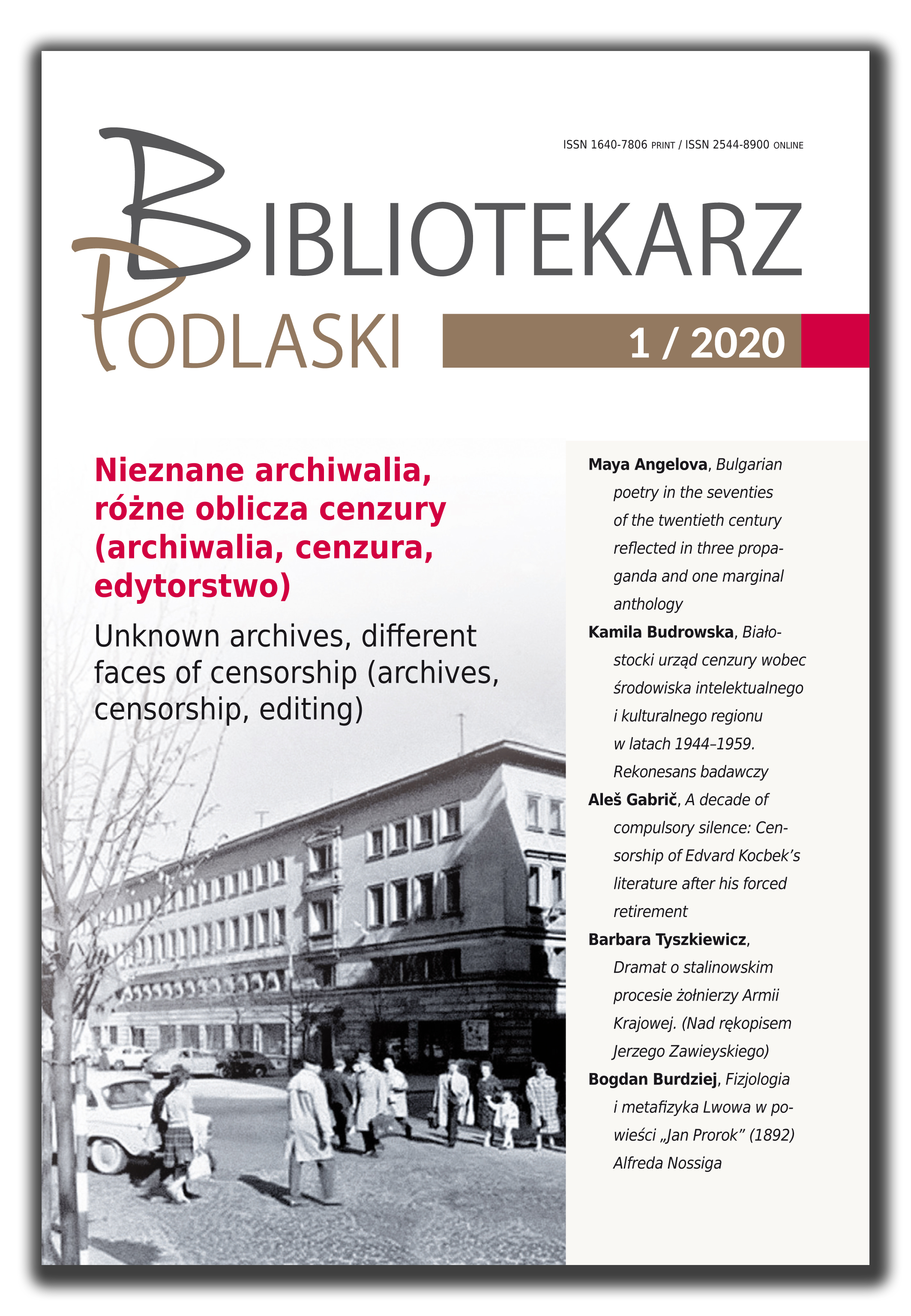Abstract
The Books of Jacob is a historical novel which describes Polish society in the 18th century. Her epic story is “a kind of game with 19th century novel”. That is why she refers to Prus’ and Sienkiewicz’s novels that have a huge impact on this genre. Tokarczuk not only reinterprets the past through herstory, but also deconstructs popular myth of multicultural Poland in which all members of society that represent different
culture and religion live in harmony. Tokarczuk’s novel breaks with the nineteenth-century model of historical narrative, in which the linear presentation of history dominates. Thanks to the introduction of many narrators coming from various environments and social groups, the story is no longer coherent. The non-linear plot, subjective and multisubjects narrative resemble a palimpsest built of numerous stories, often interwoven, and sometimes even mutually exclude. Breaking the continuity of the narrative violates the convention of the coherence of the story, and the reader’s task is to extract the threads and motifs from the novel, and then put them together, giving them their own interpretation.
References
Bratkowska K., Nowicki F., Matriarchat, [w:] Encyklopedia gender. Płeć w kulturze, red. M. Rudaś-Grodzka i inni, Warszawa 2014.
Chomiuk A., Między słowem a przeszłością. Strategie dokumentalne polskiej powieści historycznej ostatniego półwiecza, Lublin 2009.
Domańska E., Historie niekonwencjonalne. Refleksja o przeszłości i nowej humanistyce, Poznań 2006.
Gosk H., Zamiast końca historii. Rozumienie oraz prezentacja procesu historycznego w polskiej prozie XX i XXI wieku podejmującej tematy współczesne, Warszawa 2005.
https://sztetl.org.pl/pl/slownik/szechina [4.11.2019].
Ihnatowicz E., Różne postacie powieści współczesnej, [w:] tejże, Literatura polska drugiej połowy XIX wieku (1864–1914), Warszawa 2000.
Janus-Sitarz A., Przyjemność i odpowiedzialność w lekturze. O praktykach czytania literatury w szkole, Kraków 2009.
Kantner K., Jak działać za pomocą słów?. Proza Olgi Tokarczuk jako dyskurs krytyczny, Kraków 2019.
Klimowicz M., Oświecenie, Warszawa 1999.
Koziołek R., Pani Literatura, „Tygodnik Powszechny” 2019, nr 42.
Kuźma-Markowska S., Herstory (herstoria), [w:] Encyklopedia gender. Płeć w kulturze, red. M. Rudaś-Grodzka i inni, Warszawa 2014.
Larenta A., Grzybnia jako metafora w twórczości Olgi Tokarczuk, „Białostockie Studia Literaturoznawcze” 2018, nr 13.
Leszczyński G., Przemija postać tego świata. Stulecie „Faraona”, [w:] Trzy pokolenia. Pamięci Profesor Janiny Kulczyckiej-Saloni, Warszawa 1998.
Martuszewska A., Poetyka polskiej powieści dojrzałego realizmu (1876–1895), Kraków 1977.
Mitosek Z., Transformacje realizmu (od pozytywizmu do ponowoczesności), [w:] Realiści, realizm, realność. W stulecie śmierci Bolesława Prusa, red. nauk. E. Paczoska, B. Szleszyński, D. M. Osiński, Warszawa 2013.
Olgi Tokarczuk tęsknota za herezją, „Newsweek” [30.11.2014], https://www.newsweek.pl/kultura/olga-tokarczuk-ksiegi-jakubowe-premiera-wywiad-z-autorkanewsweekpl/pb3hhb3 [2.11.2019].
Olszewska M. J., Drogi nadziei. Polska proza historyczna z lat 1876–1939 wobec kryzysu kultury, Warszawa 2009.
Paczoska E., Czekając na perłę (na marginesach książki Olgi Tokarczuk o „Lalce”), [w:] tejże, Dojrzewanie, dojrzałość, niedojrzałość. Od Bolesława Prusa do Olgi Tokarczuk, Warszawa 2004.
Paczoska E., Lalka czyli rozpad świata, Warszawa 2008.
Piechota D., „Córka Wokulskiego” Romana Praszyńskiego jako literacki patchwork, „Ogród. Kwartalnik Humanistyczny” 2017, nr 1-4 (31-34).
Piechota D., Reaktywacje dziewiętnastowieczności w najnowszej literaturze popularnej, „Tematy i Konteksty” 2015, nr 5 (10).
Piechota D., W otchłani Alki. Dalsze losy Wokulskiego w świetle steampunku, [w:] Bolesław Prus. Pomiędzy tekstami, pod red. D. Piechoty, A. Trześniewskiej, Lublin 2017.
Podleszańska M., „Księgi Jakubowe” Olgi Tokarczuk jako opowieść ciała, [w:] Doczesne przygody ciała i ducha, red. B. Kuklińska, M. Gudowska, A. Gudowski, Lublin 2016.
Przerabianie XIX wieku. Studia, pod red. E. Paczoskiej i B. Szleszyńskiego, Warszawa 2011.
Schopenhauer A., Aforyzmy o mądrości życia, przeł. J. Garewicz, Warszawa 1990.
Sienkiewicz H., O powieści historycznej (fragmenty), [w:] Programy i dyskusje literackie okresu pozytywizmu, oprac. J. Kulczycka-Saloni, Wrocław 1985.
Sobolewska J., Poszukiwanie sensu w czasach chaosu, „Polityka” 2019, nr 42.
Tokarczuk O., Księgi Jakubowe, Kraków 2014.
Tokarczuk O., Lalka i perła, Kraków 2006.
Articles published in the “gold open access” mode on the basis of a non-exclusive license agreement between the publisher and the author. Permitted use:
- the publication may be read and stored on any device,
- the publication may be cited (with obligatory reference to the author, the title of the text, as well as the full title, bibliographic address of the issue and page of the journal)
The editorial team of “Bibliotekarz Podlaski” implements an open access policy by publishing materials in the form of the so-called Gold Open Access. From volume 42 (issue 1/2019), the journal is available under the Creative Commons license (Attribution – ShareAlike: CC BY-SA).
The key declarations of the Open Access and Open Science movement, which we fully support, are available on the CEON Open Science website.
COPYRIGHT:
The editorial team of “Bibliotekarz Podlaski” implements an open access policy by publishing materials in the form of the so-called Gold Open Access. The journal is available under the Creative Commons license – Attribution – ShareAlike 4.0: International: CC BY-SA 4.0).
The key declarations of the Open Access and Open Science movement, which we fully support, are available on the CEON Open Science website.
“Bibliotekarz Podlaski” allows its readers to read, download, copy, distribute, print, search and link to the full content of articles. We enable full, immediate, unlimited (both in a territorial, temporal and technical sense) open access to all published content, in accordance with the principle that freely available research increases and accelerates the global development of science and the exchange of knowledge.
The editorial team of “Bibliotekarz Podlaski” encourages authors to place articles published in the journal in open repositories (after the review or the final version of the publisher), provided that a link to the journal’s website is provided.
The journal does not charge the authors any fees for accepting and publishing their texts.


